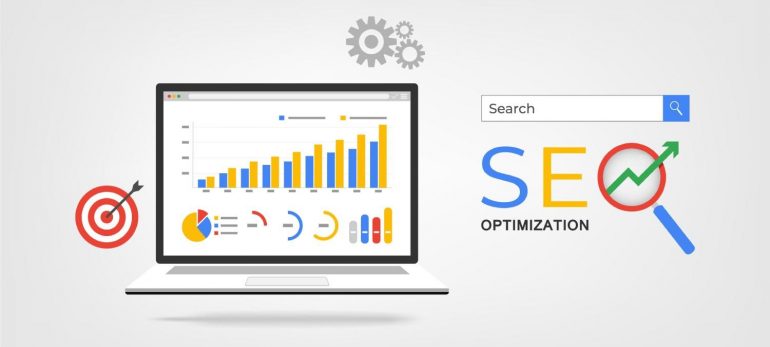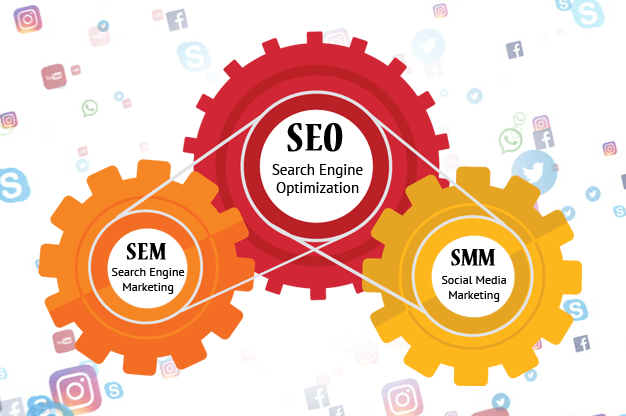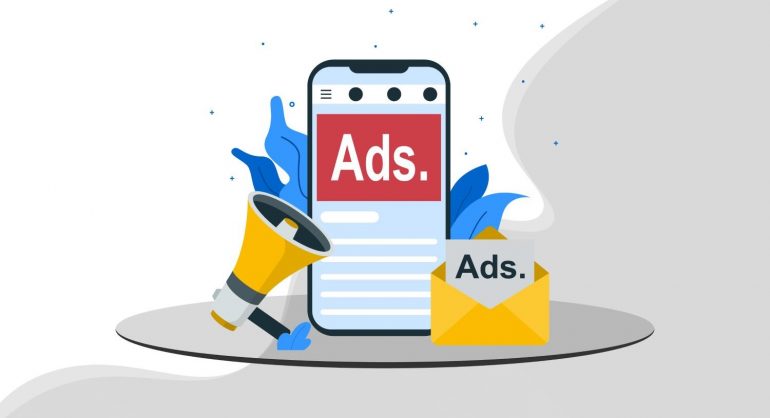What are SEO, SEM, SMM, and SMO?
Digital Marketing, like most fields, has its own set of acronyms and words to know. Getting a grasp on each one and how it is best used will help you be competitive with your content.
Search Engine Optimization
SEO stands for Search Engine Optimization and is all about making sure your content is formatted in such a way to attract the attention of search engines and ensure your website shows up on the top search engine results pages. SEO typically refers to finding the right content for your audience, selecting certain relevant keywords, and including related links to other content.

When used correctly, SEO keeps your current audience coming back for more content and drives traffic to your site. When your articles and posts are tailored to what search engines look at, they are more likely to be suggested to people browsing online.
One difference between SEO and the other strategies is that your website’s technical SEO is divided into two distinct parts: on-page SEO and off-page SEO.
On-page SEO focuses on the content of your site.
Off-page SEO looks at how popular your site is and how much people trust your information.
Though both are important, on-page SEO will determine which searches your site appears in, while off-page SEO will affect how high your site appears on the search results page.

SEO Best Practices
SEO Best Practices
Selecting your target groups, researching keywords, and analyzing data are all a part of SEO. For instance, you might analyze how different keywords or links affect your traffic or where your site shows up on the search engine results page.
Using consistent URL structure and optimizing for mobile devices will also help search engines rank your site well among other websites.
Search Engine Marketing
SEM stands for Search Engine Marketing and is another way to bring your content to your audience.
The difference between SEO and SEM is search engine optimization focuses on driving more traffic to your site through content designed to rank high in web results, while search engine marketing is about promoting your site through paid advertising.

Google Ads or Google Adwords is the most common web advertising option, though Facebook Ads and Bing Ads also provide good services for paid advertisements that will help people find your company’s quality content.
If this sounds familiar, search engine marketing is also known as Paid Advertising or Pay Per Click. These paid campaigns all use the same strategy to leverage an existing advertising network to bring traffic to your website.
Social Media Marketing
Social Media Marketing (SMM) is on the rise due to the increasing prevalence of technology and online social networking. We live in an ever-growing online world, and people are constantly filtering things out while they search for relevant content.
Social networking sites are no longer just for making personal connections. They also allow people to engage with the companies they care about and more easily find an exciting update or informative post.

The great thing about SMM is that it doesn’t require an entire marketing team, nor does it require a large paid media budget like search engine marketing. Because of this, it is an ideal area of focus for small businesses looking to increase website traffic.
Social Media Optimization
Social Media Optimization is a strategy focused on using social media to grow your company’s online presence. Though growth updates and product announcements are a good place to start, social media should really be used to promote your company’s value and message.
Your social media posts should make people interested in what you do and who you are as a business.

Effective social media optimization will focus on the more personal aspect of business, connecting with people through familiar sites such as Twitter, Facebook, YouTube, and Pinterest. Effective content should say something short and engaging and link back to your primary site for more information.
Is SMM Part of SEO?
Absolutely!
Just like you optimize your articles and website content for search engines, you also want to ensure your social media posts show up at the top of search engine results or the Recommended feed.
Once people are engaged with you, you want to make it simple to share your content through social bookmarking.

Why SMM Works
Making sure your website’s SEO is up-to-date is a good start, but many people prefer connections via social media to combing through results from search engines. Even if your site is one of the top web pages, you are likely missing out on connections if you don’t have any social media focus.
As an online marketing tool, social media is a much more personable platform and provides access to potential customers during their day-to-day activities. Instead of waiting for them to search you out, you can reach out to them in a familiar, casual environment.

Digital marketing works well in this form because clients can come to see your company for what it is: a group of hardworking people dedicated to providing a quality service. They can get to know what you stand for and what you care about, and, in turn, they will come to care about what you do and why.
Additionally, people who join you on your platform of choice will drive organic traffic to you through their own social media networks. Whether it be through sharing a link, commenting on a video, or just liking a post, their connections will see that they are engaged with you.

There are a number of recent events that have led to many companies bringing a new focus to social media marketing, including reduced marketing budgets, consumer expectations, and new purchasing paths.
Being able to adapt to changing conditions will allow you to reach your customers in the most effective ways possible.
Types of SMM
With so many social media platforms out there, it is important for you to choose the ones best suited for your business’s needs. Whether you are looking to make connections or make sure your content is accessible, finding the correct platform is an important part of your promotional strategy.

Social Networking
Social networking sites exist to bring people together. Whether you intend to make personal connections or professional ones, your company’s presence on such sites gives users access to you, and you access to them.
Social Blogging
If the services you provide are largely informational or your appeal is based on your expertise, focusing your digital marketing efforts on creating informative, relevant articles will increase your credibility.
Image and Video Sharing
Promotional images have always been an important part of marketing, and video marketing is becoming more common. From product announcements to video logs, image and video sharing is an engaging form of digital marketing.
RSS feeds can be easily referenced or linked on most networking sites.
Tips for Making your SMM Work for You
Find your Target Groups

All the aspects of social media marketing rely on reaching those who are interested in what you do. Even if your site is the top search engine result, if the person searching isn’t intrigued by your site, they will not take the time to visit it.
If you want to drive organic search results, make sure your articles, videos, and posts appeal to your target group.
When writing a promotional post for an informative article about SEO, SEM, and SMM, for example, you want your wording, images, or videos to appeal to business owners and marketing professionals.
Link to Your Website
Whether you are focused on informative posts, witty commentary, or online advertising, you should make sure your SEO, SEM, and SMM all point back to your website.
Use the attention your content earns to direct people to your site.
Link to Your Website (On Your Website)

Once customers are on your website, you want them to engage with your other content as well.
An effective way of doing this is providing them with other quality links, also on your website so that they can easily find the sort of content they are interested in.
This strategy is known as backlinking and is commonly used in blog marketing.
Find the Right Tools

Once you know what content keeps people coming back, you can be intentional about creating similar posts. There are many tools that can help you find relevant keywords for SEO, SEM, and SMM.
Your promotional strategy should be based on data rather than relying solely on your organic ranking or search engine marketing.
Understand Search Engines
Whether you’re focused on search engine optimization or search engine marketing to promote your social media channels, you need a good understanding of the common denominator: search engines.
If you want to show up on the search engine front page, you need to know what keywords people are searching for and what types of results show up on the search pages.
Your title tags – the titles that will show up as links in the search results – also go a long way towards bringing more traffic to your site. In other words, those should be accurate summaries of what the page is about.
Tailor Your Message

Social platforms provide a lot of information about your audience, and this is data you can use to communicate more effectively.
For example, if you know a large portion of your audience is in a certain area, understanding what trends affect that area can help you speak more directly to your target group.
Be Brief
When it comes to your marketing strategy on social sites, you want to keep your messaging brief. Most people are not browsing Instagram or Twitter in search of a long blog post or article.
If you are on one of these platforms, the goal should be to say something concise and interesting. This will drive engagement with your audience, and if you are linking to your website, they will know where to find more content.
Say Something About You
Digital marketing is all about letting your customers know who you are, and your digital marketing tactics should focus on conveying what your company values.
Your customers want to know what you stand for and who you are. Using your platform to tell them directly can be more powerful than SEO, SEM, and SMM.
Consider Ads

Paid ads can boost your digital marketing efforts. If you can create ads that will appeal to your target audience, they will augment your paid digital marketing efforts and potentially reach a different portion of that audience.
Pay per click or search engine marketing strategies work well, and paid traffic can become reoccurring traffic if your ads’ content piques their interest. Paid advertising can be a good way to boost your digital marketing.
Stay Engaged
Since the economy is now built on relationships, customers are coming to expect engagement with the companies they patronize.
Using your social media networks to connect with customers on a personal level inspires trust.
You should not only focus on offering relevant content but also be responsive to customers’ comments and concerns. This will build trust, and your clients will remember that.
Conclusion

With online marketing on the rise, SEO, SEM, SMM, and SMO are all important parts of your digital marketing strategy. They can help you to drive organic traffic to your site and engage with those who might not be searching for you directly.
Since there is so much to consider about SMO, SEO, SEM, and SMM, partnering with or learning from an experienced content creation company like ContentAdore can help you optimize your digital marketing outreach strategy for search engines and customers alike.


 (4 votes, average: 4.00 out of 5)
(4 votes, average: 4.00 out of 5)